- Home
- Alison McGhee
Pablo and Birdy Page 3
Pablo and Birdy Read online
Page 3
“This happened when you first arrived,” he said. “You had no clothes, no belongings, no papers, nothing but your necklace and that green blanket. You had no name, or so I thought anyway, and I was trying to think of a good one. You lay in the dresser drawer—that was what I used as a crib—looking up at me with those serious dark eyes, and I started trying out possibilities.”
Emmanuel had started going through names, one after another: José. Diego. Tomás. Juan. Gabriel. Jesús. Samuel. None of them had seemed right to him.
“Those all sound like good names,” Pablo said.
“They were, but none of them felt like the perfect fit,” said Emmanuel. “So I kept going. Felipe. Rodrigo. Bautista. No, no, no. Then came Pablo, and that was when Birdy leaped to the rim of the dresser drawer and balanced there. She raised both wings”—he raised his arms in imitation—“and stood staring at me. And that was it,” he said. “Pablo it was.”
And Pablo it had remained.
“I believe she was telling me, in her own way, that Pablo was your given name,” Emmanuel said. “I believe that was Birdy’s way of talking to me.”
If that was her way of talking, Birdy wasn’t at all like the other parrots in town. She wasn’t a budgie or a monk parakeet or a blue-fronted Amazon or a conure or a macaw or any of the talking birds that lived in Isla.
“What about Birdy?” Pablo asked. “How’d she get her name?”
“From you.”
“Me? How?”
“One morning, a few days after you arrived, I woke up to hear you laughing. I looked over at the dresser drawer and there was Birdy, doing a little dance on the side of it.” Emmanuel smiled. “She was dancing, and you were laughing, and then you waved your hands and said ‘Birdy.’ ”
He began to shuffle the cards. “Birdy was your very first word, mi Pablito.”
“Well, it is a good word,” Pablo said.
Birdy, who had been silently watching them the whole time, ducked her head into Pablo’s shoulder. She seemed to agree.
SEVEN
DESPITE THE LACK of an actual Seafarer, the shopkeepers who lived in Isla made the most of its reputation as the place where one would most likely be spotted. There was the Parrot Café, there were T-shirts featuring the favorite phrases of the chattiest town parrots, there were glass-bottom boat tours of the “Famous Seafarer Spotting Grounds.” Lula designed a new parrot henna tattoo each week. Pierre’s parrot-shaped cookies with neon frosting were nearly as popular as his perennial bestseller elephant ears. Isla Ice Cream even featured Parrot Sorbet, which Pablo secretly thought was a terrible name for rainbow sherbet but which sold by the bucketful.
As Emmanuel said, “We have to make a living, right? Might as well give the people what they want.”
So they did.
Pablo and Emmanuel sold parrot souvenirs of all kinds at Seafaring Souvenirs: mugs with parrots painted on them, maps of Historical Seafaring Parrot possible sightings, cans of Air Possibly Breathed by Seafaring Parrots, coconut candies with wrappers that featured parrots, key chains that featured a parrot with giant talons and a terrifying glare in its eyes. (The key chains were not big sellers.) Emmanuel spent many late nights listening to the Buena Vista Social Club and designing new Seafaring Parrot T-shirts. He was the best T-shirt designer in town, just as Lula was the best tattoo artist.
Pablo himself had a specialty as well: parrot seashell paintings. He collected pretty shells at low tide, then biked them back home, with Birdy perched uncomfortably in the basket on top of the lumpy shells. At night, when the store was closed, he and Emmanuel sat at the table. Emmanuel worked on his T-shirt designs and Pablo, using a miniature sable brush, painted tiny acrylic parrots on the insides of the seashells. Each had a caption: African Gray, Monk Parakeet, Budgie.
Peaches.
Sugar Baby.
Mr. Chuckles.
They were his models, even if they didn’t know it. Pablo had even begun painting a tiny Rhody, with the caption Chicken, so as not to mislead anyone that Rhody was anything but a parrot wannabe. Tourists were very fond of Pablo’s Painted Parrots, which he sold for the reasonable price of one dollar apiece.
From the start, Lula and Pierre had advised Pablo to branch out into painted Seafarers. Tourists had a never-ending hunger for Seafaring Parrot souvenirs, so why not? “Just make up what one looks like,” Lula had said. “Call it an artist’s rendering.” But Pablo had always refused. He didn’t want to paint a parrot with no real-life model to draw from, a parrot that could well be imaginary. Wouldn’t that be a lie?
“It would be an embellishment,” said Lula.
But an embellishment was a kind of lie too. No. Pablo stuck to the parrots he knew, punctuated by the occasional Rhode Island Red chicken.
In the morning, before the store opened, Pablo and Emmanuel and Lula and Maria usually met at Pierre’s Goodies, just down the block from Pablo and Emmanuel’s apartment.
“Fortification,” Lula referred to their morning get-togethers. “Preparation for the onslaught.”
That was life in Isla, where most of the townspeople worked in the tourist trade. Every morning, before they opened their shops for the day, the Isla shopkeepers wandered into Pierre’s bakery empty-handed and emerged with lidded cups of coffee or tea and white waxed paper bags. The big Pierre’s Goodies picture window displayed an array of pastries: croissants both plain and chocolate; cinnamon, blueberry, and cream scones; and assorted rolls and breads. Parrot cookies with enormous beaks and gumdrop eyes. And of course, Pierre’s famous elephant ears.
The Committee liked to peer in the picture window too, even though they were too short to view the pastries unless they fluttered up into the air, which they took turns doing.
“What day is it?”
“Hey! Watch what you’re saying!”
“Cock-a-doodle-doo!”
Sometimes they landed on one another, which didn’t go over well with any of them.
This morning Pablo and Birdy were the first ones at the bakery. The Committee caught sight of them and began trundling down the sidewalk from the bus stop, Rhody crowing maniacally to get their attention.
Lula was sweeping the sidewalk in front of her henna tattoo store. Lula was as meticulous about her sweeping as she was about her tattoos. Nearly all of them featured Lula’s “artist’s renderings” of Seafaring Parrots, with a few seashells and palm trees thrown in. Lula’s tattoos were highly sought-after, partly because henna tattoos didn’t involve needles, which meant that they didn’t hurt, and partly because they faded away in a week or so, which was good because Lula was not a believer in permanent tattoos.
“Give it up, Rhody,” she said now. “When will you learn that you’re not a parrot and you never will be?”
Rhody crowed again, even louder. The rest of the Committee clustered around Pablo and Birdy, with Peaches nudging Mr. Chuckles to get closer to Pablo. Inside the bakery, Pierre looked up from behind the counter and motioned them in.
“Bonjour, Pablo. Bonjour, Birdy. Committee”—he waved his arms, shooing the other birds back—“not today. Too crowded.”
Pierre was not French, but he had once spent three weeks in Paris, learning the fine points of pastry making, and France had rubbed off on him. His real name was Peter McGarry, but after Paris he had changed the Peter to Pierre and left off the McGarry entirely. He liked to buy a single flower from the flower lady every day, to put in his apron pocket. Today’s was a daisy.
“Pour Mademoiselle Birdy,” he said, and he held out a bowl of diced apple to Pablo. “And for you, monsieur.” He handed him a cupcake with sprinkles on top in the shape of a birthday candle. There was a small commotion at the door, an abbreviated rooster’s crow followed by a squawk. The Committee was doing their best to gain entry. Pierre raised both arms in the air and made as if to charge the door, and once again they retreated to the sidewalk.
“Persistent,” Pierre said, “persistent, but Pierre shall triumph.” He winked. “Almost your b
irthday, Pablo, non?”
Pablo nodded.
“Double digits?”
“Yeah.”
“Any special plans?”
Pablo shook his head.
“I have a special plan,” said Lula, who had come in for her morning mint tea and was right behind Pablo. “My special plan is to create a new tattoo in honor of your birthday.”
“That’s always your special plan,” said Pierre. “Every year, another special tattoo.”
“Same as you,” said Lula. “Another year, another cake.”
“I wish you’d both stop,” said Pablo.
Oops. He hadn’t expected to say that. It had just popped right out of his mouth. That was the kind of thing he would think inside his head, or tell Birdy when they were alone at the shore. It was not the kind of thing he ever said to anyone else.
Lula and Pierre looked surprised, and Lula opened her mouth to say something, but the double-decker bus had just pulled up to the curb and a gaggle of tourists came pushing their way in, exclaiming over the elephant ears that Pierre’s Goodies was famous for, and Pierre glanced at Pablo and Lula apologetically and got back to work.
Out on the sidewalk again, Pablo set the bowl of diced apple beside him on the bench. The Committee stood by watchfully, hoping that Birdy would feel like sharing, but she ignored them. Lula disappeared into her tattoo shop.
Maria came out of Pierre’s carrying a cinnamon roll in one hand and a cup of coffee in the other and sat down on the bench next to Pablo. Across the street, the Critter Clinic was still closed, but a line was beginning to form. A woman sat on the clinic bench with a cat on her lap. A man holding a shoe box, with what looked like a ferret poking its head out of it, sat next to her. A small girl with a teddy bear in her arms stood next to the bench. Stuffed animals were as welcome as living animals at Maria’s clinic. She was an equal-opportunity veterinarian.
Now she eyed the small line of patients and their keepers with a practiced eye. They could all wait, apparently, because she took a bite of cinnamon roll and offered it to Pablo.
“No, thank you.”
“So,” she said. “Almost ten, huh?”
“Yes.”
“And do you have any plans?”
“Yes,” Pablo said. “I do.”
“Care to share?”
“I plan to do something brave.”
Yikes! Pablo hadn’t expected to say that, either. He didn’t even know what the something brave might be. But Maria just sat there, nodding, as if she weren’t surprised. Did she think he was the kind of person who did brave things? Because I’m not, thought Pablo.
She seemed to be gathering her thoughts to say something. But then a woman with a miniature goat on a leash joined the line at the clinic across the street, the ferret popped right out of the box on the man’s lap, and the cat squalled and began swiping at it with its claws. The Committee watched with interest.
“Simmer down there!” squawked Peaches. “Simmer down!”
Maria sighed and got up. She brushed the crumbs off her doctor coat, drank down the rest of her coffee, and looked at Pablo. He braced himself for more questions. About his double-digit birthday, about whatever it was that he had in mind for it. But she just smiled.
“So,” she said. “Something brave, huh? I’ll be interested to see what that turns out to be.”
EIGHT
PABLO AND BIRDY didn’t know it, and neither did Maria or Lula or Pierre, but as they were gathering themselves for the tourist onslaught, a young dog, new to Isla, was only a few yards away from them. He was a scruffy little thing who stuck to the shadows. He sidled along the alley that ran behind the buildings on the block, sniffing all the unfamiliar smells of the town. His tail had been broken at some point and hadn’t healed properly, so the tip bent to the side and kept brushing against the back of the brick-and-frame buildings that lined the alley.
The dog didn’t want to be discovered. This wasn’t hard, because the alley was dark and too narrow for cars and bikes. It wasn’t the sort of place that pedestrians ventured down either. Lidded garbage cans stood next to the closed back doors of silent stores.
The dog stopped by one of those garbage cans and snuffed around it. This can was particularly delicious smelling. Meat scraps. Carrot peelings. Cake and pie crumbs. Possibly a bone or two, maybe even three.
His stomach growled. His tongue lolled out and he drooled.
It had been a long, long time since the dog had had any food. Three days, or four, or even longer, and the last thing he had eaten was a half-rotten fish, too rotted even for bait, that had washed up onshore. Cast off from a fishing boat, maybe. Stinky though it was, the dog had gobbled it down and then disappeared back into the scrubby woods that lined the shore.
Finally, in the middle of the last night, his hunger had gotten the best of him, and he had slunk into the town itself, drawn to this particular alley because it backed onto the Parrot Café and Pierre’s Goodies. Now that the sun was up, he was exploring. So far he hadn’t been able to dislodge any garbage can lids, nor were there any discarded scraps of food from pedestrians, not back here.
He moved on and his bent tail brushed against another garbage can. This one smelled of ink and graphite and paper. Nothing edible. Nothing interesting. Onward.
But the farther he crept, the more smells reached his nose. The smells of fresh food. Delicious food. Food of all kinds. He crept on down the alley, following his nose. At the far end was sunlight and color and the sounds of cars and people and maybe even other animals. Birds, certainly. And food. The smell of food, wonderful food, precious food. So much food.
Could he manage to get hold of some of it?
NINE
EVERY YEAR, ON Pablo’s non-birthday, Pierre baked him a special cake, Lula designed a new birthday tattoo, and Emmanuel came up with a new theory to explain Pablo’s miraculous arrival on the shores of Isla. These celebrations had been going on for almost ten years now. Pablo wished everyone would just quit, but then again, he had never told them that the very idea of his birthday made him sad. And now so much time had gone by that he didn’t know how to bring it up, not even with Emmanuel. He had told only Birdy how he felt in his heart of hearts.
What made things worse was that Isla went into high-gear tourist season right around the same time. Tourist season and birthday got mixed up together in Pablo’s mind, and it felt as if his entire town was celebrating something he didn’t want to be reminded of.
But Emmanuel always said, “If you live in a place like Isla, you play to the crowd.”
Right outside Pablo and Emmanuel’s apartment windows, in fact, was a constant reminder of playing to the crowd. A slender steel cable stretched from an enormous hook just below their apartment all the way across the street, and on the cable hung a Seafarer painting silk-screened onto a huge banner. The painting, which was what Lula would call an “artist’s rendering” of the mythical bird, rippled and flapped in the breeze. Sometimes Pablo and Birdy would stand at their bedroom window, looking out. On cloudless nights the giant painted parrot shone in the moonlight, its huge staring eyes visible to the boy and the bird in the window. It was a little creepy.
The cable ended across the street, just below a stone ledge on which perched a grotesque, a carved creature supposedly set there for protection. It was made of stone, a magnificent being unlike any animal or bird that Pablo had ever seen. Its enormous birdlike talons gripped the side of the brick building. It had a hunched, scaly back, large wings folded against its sides, hooded eyes that seemed to see in all directions at once, and a mouth that was half-open, revealing even stone teeth. Despite the fact that the grotesque never moved—it was made of stone, after all—it seemed almost alive to Pablo. Emmanuel agreed.
“The grotesque is another mythical beast,” he said. “Some say that grotesques were once alive. That they lived here hundreds of years ago, thousands maybe, and that they’re suspended now, neither fully alive nor fully dead.”
“Why are they suspended?”
“To watch over the animals and birds of Isla. To make sure that none of them end up like the grotesque, trapped, neither here nor there.”
Pablo wasn’t sure how he felt about the grotesque. On nights when they stood at the window, Birdy would press her head against the screen and look straight across at it. The grotesque seemed to be looking back at her, too. Its talons gripped the ledge and its body hunched over as if it had been caught and trapped just when it was about to fly. Birdy would shift from foot to foot, which was her sign of unease, when she looked at it.
“Maybe she thinks the grotesque is a bird too,” Emmanuel said. “Another bird that can’t fly, like her.”
This didn’t make sense to Pablo. The grotesque looked nothing like Birdy. But Birdy did seem fascinated by it. Sometimes, even on still nights, Pablo woke up to see her silhouetted against the window screen, staring out. When he called to her, she would flutter back to the suitcase. On those nights, Pablo would make himself stay awake until she drew one foot up and settled into sleep. Then he himself could finally close his eyes.
Pablo rocked himself to sleep every night. Emmanuel had figured out early on that his baby boy needed motion.
“My theory is that it’s because you floated in on the waves,” he said. “The ocean rocked you to sleep, and however long you were out there, you must have gotten used to it.”
That was why there was no bed in Pablo’s room. Instead Emmanuel had drilled two hooks into adjacent walls and strung a hammock woven from slender lengths of colorful rope from hook to hook. At night, Pablo stretched the hammock out and tipped himself and his blankets and his pillow into it. He pushed off with one hand and set it gently rocking. After a while, the motion of the swinging hammock felt like the rocking of a boat on the waves, and that was how he drifted off to sleep every night.

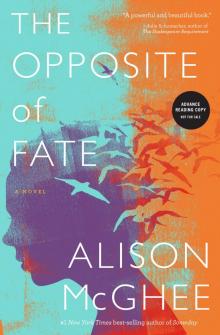 The Opposite of Fate (ARC)
The Opposite of Fate (ARC)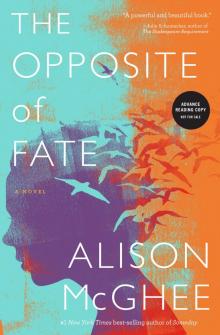 The Opposite of Fate
The Opposite of Fate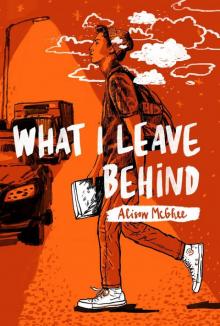 What I Leave Behind
What I Leave Behind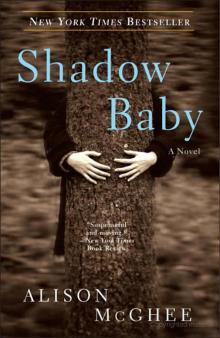 Shadow Baby
Shadow Baby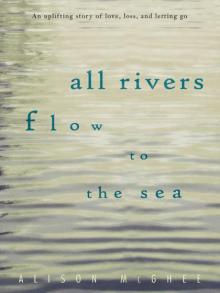 All Rivers Flow to the Sea
All Rivers Flow to the Sea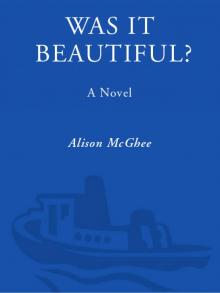 Was It Beautiful?
Was It Beautiful?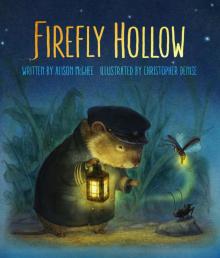 Firefly Hollow
Firefly Hollow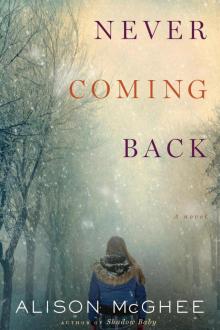 Never Coming Back
Never Coming Back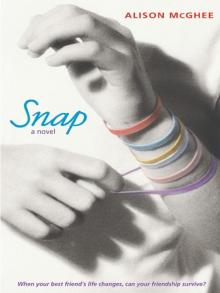 Snap
Snap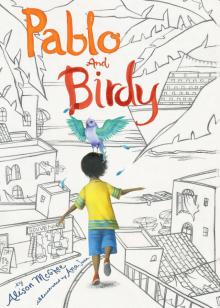 Pablo and Birdy
Pablo and Birdy